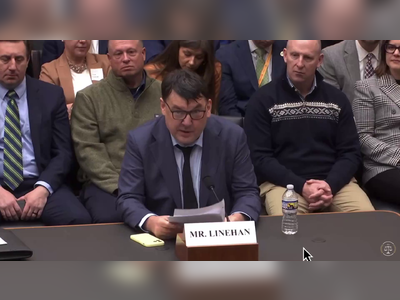
Measles Epidemic Expands in Texas: Health Officials Respond to Rising Cases
The resurgence of measles cases in the U.S. raises concerns after another child dies from the virus.
An ongoing outbreak of measles has continued to spread in Texas, following the recent death of a second child from the viral infection.
The child, an eight-year-old girl, was hospitalized due to complications related to measles, according to Aron Davis, Vice President of UMC Health System.
The American Secretary of Health, Robert F. Kennedy Jr., under scrutiny for his handling of the outbreak, visited Texas on Sunday in the wake of the child's death, marking the third fatality linked to this outbreak in recent weeks.
As of now, Texas has reported a total of 480 measles cases since the beginning of the year, with the virus also spreading to neighboring states.
Nationally, the United States has documented more than 600 cases of measles, a substantial increase from the 285 cases logged during the same time frame last year by the Centers for Disease Control and Prevention (CDC).
Most of this year’s cases, nearly all among unvaccinated individuals, are associated with an outbreak that originated in western Texas.
"This tragic event underscores the importance of vaccination.
Measles is a highly contagious disease that can lead to serious complications, especially among the unvaccinated," Davis stated.
In a statement on social media, Secretary Kennedy confirmed the girl's death, sharing that his intention for his visit was to quietly offer support to the families and the community during their time of grief.
He also indicated that he is engaging with Texas officials to enhance collaboration between federal and state health authorities in managing the measles outbreak.
Kennedy announced plans to dispatch a team to support the distribution of vaccines, medications, and other essential resources.
He stressed, "The most effective way to prevent the spread of measles is the MMR vaccine," referring to the vaccine that protects against measles, mumps, and rubella.
The first reported death related to measles this year occurred in February, involving a six-year-old girl from a local Mennonite community.
Subsequently, an unvaccinated man died in New Mexico in March after contracting the virus, although the cause of his death is still under investigation.
As of now, the number of cases remains relatively low compared to historical data.
The disease is known to cause fever, rash, cough, and other symptoms, and it can lead to severe complications such as pneumonia, encephalitis, and death.
In the year 2000, the United States declared measles eliminated; however, outbreaks have re-emerged due to a rising vaccine skepticism among certain populations.
Two doses of the measles vaccine are shown to be 97% effective in preventing the virus and significantly reduce severe infections.
Experts maintain that to achieve herd immunity, which helps protect unvaccinated individuals, about 95% of the population must be vaccinated.
The recent outbreak is linked to a religious community that strongly opposes vaccinations.
Local health officials in western Texas have indicated limited progress in efforts to improve vaccination rates.
Kennedy's initial response to the outbreak faced criticism from health experts, citing inadequacies in addressing the situation.
Kennedy has previously expressed skepticism towards vaccinations, initially labeling the outbreak as “unusual.” However, he shifted his stance following the tragic death in February, although he did not directly advise parents to vaccinate their children, instead recommending consultations with their healthcare providers.
Recently, Senator Bill Cassidy, a Republican from Louisiana, has called for a stronger response, emphasizing the need for clarity from top health officials regarding vaccination.
"Everyone should get vaccinated," Cassidy stated, urging that public health leaders make unequivocal statements before any further tragedies occur.
The child, an eight-year-old girl, was hospitalized due to complications related to measles, according to Aron Davis, Vice President of UMC Health System.
The American Secretary of Health, Robert F. Kennedy Jr., under scrutiny for his handling of the outbreak, visited Texas on Sunday in the wake of the child's death, marking the third fatality linked to this outbreak in recent weeks.
As of now, Texas has reported a total of 480 measles cases since the beginning of the year, with the virus also spreading to neighboring states.
Nationally, the United States has documented more than 600 cases of measles, a substantial increase from the 285 cases logged during the same time frame last year by the Centers for Disease Control and Prevention (CDC).
Most of this year’s cases, nearly all among unvaccinated individuals, are associated with an outbreak that originated in western Texas.
"This tragic event underscores the importance of vaccination.
Measles is a highly contagious disease that can lead to serious complications, especially among the unvaccinated," Davis stated.
In a statement on social media, Secretary Kennedy confirmed the girl's death, sharing that his intention for his visit was to quietly offer support to the families and the community during their time of grief.
He also indicated that he is engaging with Texas officials to enhance collaboration between federal and state health authorities in managing the measles outbreak.
Kennedy announced plans to dispatch a team to support the distribution of vaccines, medications, and other essential resources.
He stressed, "The most effective way to prevent the spread of measles is the MMR vaccine," referring to the vaccine that protects against measles, mumps, and rubella.
The first reported death related to measles this year occurred in February, involving a six-year-old girl from a local Mennonite community.
Subsequently, an unvaccinated man died in New Mexico in March after contracting the virus, although the cause of his death is still under investigation.
As of now, the number of cases remains relatively low compared to historical data.
The disease is known to cause fever, rash, cough, and other symptoms, and it can lead to severe complications such as pneumonia, encephalitis, and death.
In the year 2000, the United States declared measles eliminated; however, outbreaks have re-emerged due to a rising vaccine skepticism among certain populations.
Two doses of the measles vaccine are shown to be 97% effective in preventing the virus and significantly reduce severe infections.
Experts maintain that to achieve herd immunity, which helps protect unvaccinated individuals, about 95% of the population must be vaccinated.
The recent outbreak is linked to a religious community that strongly opposes vaccinations.
Local health officials in western Texas have indicated limited progress in efforts to improve vaccination rates.
Kennedy's initial response to the outbreak faced criticism from health experts, citing inadequacies in addressing the situation.
Kennedy has previously expressed skepticism towards vaccinations, initially labeling the outbreak as “unusual.” However, he shifted his stance following the tragic death in February, although he did not directly advise parents to vaccinate their children, instead recommending consultations with their healthcare providers.
Recently, Senator Bill Cassidy, a Republican from Louisiana, has called for a stronger response, emphasizing the need for clarity from top health officials regarding vaccination.
"Everyone should get vaccinated," Cassidy stated, urging that public health leaders make unequivocal statements before any further tragedies occur.
AI Disclaimer: An advanced artificial intelligence (AI) system generated the content of this page on its own. This innovative technology conducts extensive research from a variety of reliable sources, performs rigorous fact-checking and verification, cleans up and balances biased or manipulated content, and presents a minimal factual summary that is just enough yet essential for you to function as an informed and educated citizen. Please keep in mind, however, that this system is an evolving technology, and as a result, the article may contain accidental inaccuracies or errors. We urge you to help us improve our site by reporting any inaccuracies you find using the "Contact Us" link at the bottom of this page. Your helpful feedback helps us improve our system and deliver more precise content. When you find an article of interest here, please look for the full and extensive coverage of this topic in traditional news sources, as they are written by professional journalists that we try to support, not replace. We appreciate your understanding and assistance.











